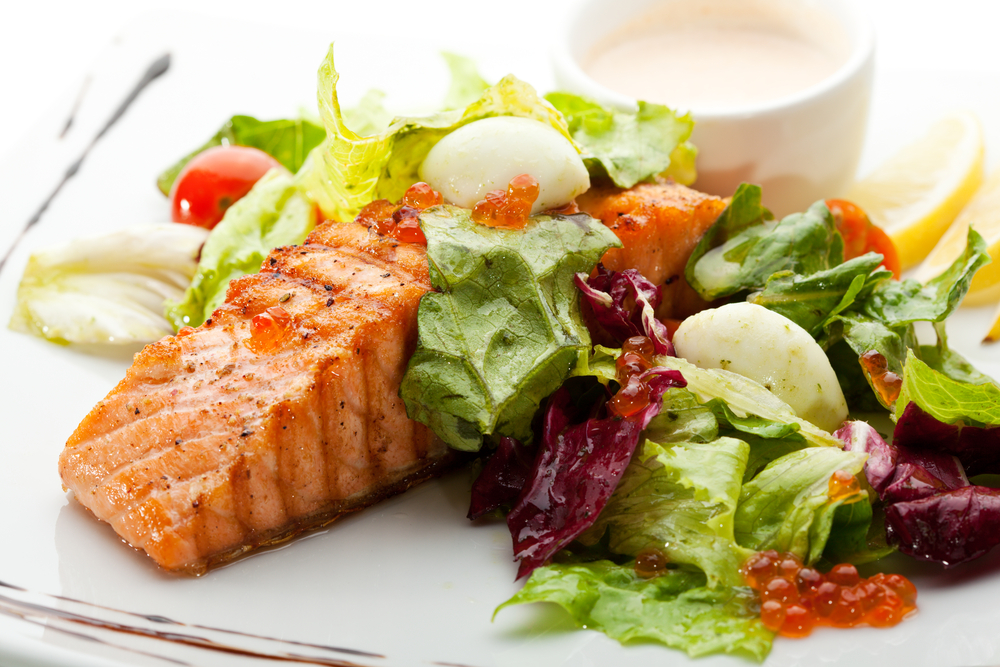Despite seeing a lot more media coverage in recent years, the menopause can still feel like a mystery – and often creeps up on people without much warning.
There’s a lot of info out there about how to manage symptoms – but it’s often hard to say how current and effective the things people talk about actually are. This is never more true that when it comes to talking about diet – a topic that’s often flooded with strange ideas and faddy (and ineffective) plans.
That said, small changes to our diets can bring an overwhelming relief to many symptoms – the key is knowing which are the best sources of information.

In this article we will run through what the menopause is, the changes your body is going through because of it and how the food you eat can help to reduce the severity of peri-menopausal and menopausal symptoms.
What is the menopause?
The menopause is when a womens periods stop due to low hormone levels. This usually occurs around the age of 45-55 years, however it can occur sooner naturally or as a result of surgeries such as an oophorectomy (removal of ovaries) or a hysterectomy (removal of the uterus). Cancer treatments such as chemotherapy and/or genetics can also cause menopause to occur early as well.
Symptoms of the menopause can fall into 2 categories: Physical and Mental. The physical signs and symptoms are likely to be the most noticeable as they include the stopping of your periods, hot flushes, difficulty sleeping, change in body shape and weight gain, headaches and migraines that are worse than usual, and skin changes such as now having dry and itchy skin. When you start to get a combination of all of these things and you are in or near to the age category for the menopause, it’s a highly likley the cause of the changes.

With regards to changes within your mental health, these may not be as easy to spot. Especially as awareness around Mental Health and the psychological changes pre and during the menopause are not documented as much as the physical changes. The mental health symptoms of the menopause include low mood, anxiety, mood swings, low self esteem but also problems with memory or concentration. A lot of people with the menopause complain of experiencing ‘brain fog’. These symptoms can often be shrugged off as “having a bad day” or “just not feeling yourself at the moment” and are often overlooked.
Perimenopause is when you have symptoms before your periods have stopped. You reach menopause when you have not had a period for 12 months. During perimenopause you may experience some physical and/or mental symptoms, however these can change over time.
All symptoms will have a detrimental effect on everyday life and the main symptoms people like to combat quickly are their sleep quality, weight gain and anxiety levels. These usually have the biggest impact on our day to day lives, both work and social. Our diets can have a huge impact on reducing the symptoms and allowing our day to day lives to stay relatively normal and how they used to be.
What do we mean when we say ‘diet’ at Fitness Lab?
When we talk about ‘diets’ and ‘diet culture’ here at the Fitness Lab we are talking about having a sustainable and good relationship with food that comes from well rounded habits that allow for flexibility.
Making meaningful changes to your eating and nutrition habits can lead to a lasting shift in your day to day and week to week habits.
Rather than looking for the next “quick fix” which ends up doing more damage than good both physically and mentally. Sustainability is key when it comes to your nutritional habits. Seeing your food as fuel is a great way of shifting your mindset and creating that awareness around what you are eating but also why you are eating it.
Why does a change in eating habits help during the menopause/peri-menopause?
During the menopause/peri-menooause there is a signifcant drop in oestrogen levels resulting in physical changes to the body, including an increase in bloody proessure, a change in cholesterol levels and also losing calcium from the bones.
These can lead to an increased risk of heart disease and osteoporosis. Hormone imbalances also lead to a reduced metabolism, resulting in weight gain. An increase in weight gain not only has an effect physically such as an increased risk of diabetes or heart disease but also mentally. Mental stress around our aesthetic can lead to further hormone imbalances such as increased cortisol levels.
For all women, diet and lifestyle changes can be made to help with symptoms. Small changes can be made to everyday meals that can make a huge difference in having balanced hormone levels.
How does the menopauses effect our hormones?
During the peri-menopuasue and in turn the menopause, our oestrogen levels gradually begin to drop. Oestrogen is a hormone and therefore a reduction in this hormone has an affect on other hormones in our body. A reduction in oestrogen levels leads to an increase in ghrelin, a decrease in leptin, increased cortisol, and also a reduction in good quality sleep.
Oestrogen is also considered to be an appetite suppressing hormone and one form of oestrogen, estradiol, helps to regulate metabolism and body weight. So as it reduces, appetite can increase.
Ghrelin is a hunger stimulating hormone. This hormone is increased especially during the perimenopause stage which can lead to a constant feeling of hunger and on the other end of the spectrum, Leptin decreases. Leptin is our hormone that promotes a sense of fullness and is reduced during all parts of the menopause.
Food and mental well-being
A combination of constantly feeling hungry, body shape changing and other physiological and mental changes all lead to an increase in stress and cortisol levels. Persistent stress and feelings of being stressed lead some people to overeat or ‘comfort’ eat. Oestrogen has a cortisol dampening effect and when this is diminished, stress fueled appetite can increase.

Food can affect the production and secretion of hormones by direct actions on the gut, by nervous reflexes, through changes in the concentration of various metabolites in the blood, or secondary to changes in circulating gut hormone levels.
Poor nutritional value within your diet can contribute to hormonal imbalances and certain foods can either restore or throw off your hormonal balance. However, everyone’s diet is completely different and what works for some may not necessarily work for others. This is true for everyone as well, not just those going through the menopause.
Food, sleep, and the menopause
Putting all this together, we finally come to sleep. Hormone imbalances and changes through peri-menopause and the meopause can inmpact sleeping patterns quite significantly. Hormones affect body temperature, potentially leading to night sweats and causing you to wake up multiple times in the night. Insufficient sleep further leads to an increase in appetite and also leads to making not so good choices when it comes to nutrition and the symptoms of the menopause.
Unfortunately it’s a revolving door of not great news – but a lot of these changes can be brought under control through changes in your diet. New habits that are sustainable can create a new revolving door of constantly reducing symptoms and their harshness on our day to day lives.
What are some foods that help during the menopause?
There are a wide range of foods that can help alleviate menopause systems.
For bone health, Calcium is key. From the age of about 35 we start to lose calcium from our bones. The rate of this increases as our oestrogen levels drop increasing the risk of osteoporosis. By keeping an eye on our Calcium intake we can potentially reduce the chances of experiencing osteoporosis. To help keep your calcium levels as high as possible, 2-3 portions of calcium rich foods are advised. This includes, milk, yoghurt, cheese (yes I said cheese!!) and also milk based puddings such as custard or rice pudding.

To alleviate the risk of heart disease it’s important to keep your body fat % within the desirable category for your age and height. This means eating at maintenance calories or in a very slight deficit. This will help lower cholesterol levels and blood pressure. The British Dietetic Association (BDA) makes a few suggestions that I have listed below:
- Switch from saturated to unsaturated fats by cutting down on fatty meats, switching to low saturated oils and spreads, choosing lower fat dairy and grilling rather than frying your food.
- Include meals based on fish, nuts, beans or pulses at least once or twice each week.
- Eat at least four to five portions of unsalted nuts, seeds and legumes per week.
- Reduce your intake of refined sugars like sweets, cakes and soft drinks.
- Reduce salt by avoiding processed foods like ready meals, soups and cooking sauces, and limiting salted snacks. Cooking from scratch means you can use different ingredients for flavour such as herbs and spices.
- Aim for at least two portions of fish per week, one which should be oily as these are rich in omega-3 fats. Oily fish includes canned sardines, mackerel, salmon, trout and herrings.
- Fruit and vegetables provide vitamins, minerals, fibre and other plant nutrients such as antioxidants that help protect your heart. Aim to get your 5-a-day from a range of different coloured fruits and vegetables every day. ALL types can count (fresh, frozen, canned, dried or juiced).
- Swap to higher fibre foods, such as whole grain breads, high fibre breakfast cereals and brown rice whenever you can. Oats, wholegrain cereals and breads as well as pulses like lentils, chickpeas and beans are all excellent sources of fibre and heart friendly.
If you are vegan or vegetarian there is always the option to consume more plant oestrogens. They have a similar chemical structure to our own body’s oestrogen (one of the main female hormones), and are able to bind to the same receptors that our own oestrogen does. Examples include, nuts, seeds, fruit, vegetables, soy products and grains.
Not all of the above needs to be stuck to religiously. Small changes here and there will have a huge impact on how you feel. Find which ones are sustainable and stick to those. If there is something on that list that you really don’t like, or doesn’t agree with you – then leave it.
What are some foods that can make the symptoms of the menopause worse?
Everything in life comes down to moderation. Moderation is key with everything that we eat and drink. Caffeine and alcohol are two things that have been shown to aggravate and increase symptoms. They can unfortunately make hot flushes worse, and also play havoc on your natural circadian rhythm potentially ruining sleep cycle further.
Then we’re back into talking about increased cortisol levels again. We don’t need to completely eradicate caffeine and alcohol from our diet. Life’s simple pleasures can help with the mental side of the menopause symptoms ut finding that happy medium could be key to a better state physically and mentally when going through the menopause.

No food or drink is completely off limits when it comes to your diet during the menopause. Just adding a few extra things in here or there or swapping out others for more beneficial foods can help keep new habits sustainable.
Some new things or changes may work for some and not others. Trial and error with new things will alway require some patience. Diets and food habits are complicated at the best of times but finding what works for you and what doesn’t is going to be key.
What might some dietary changes look like for a client?
Some starting dietary changes for women who are looking to change their diets to alleviate symptoms could be the following:
- Hydrate before your caffeinate: Drinking a pint of water before your coffee or tea
- Protein in every meal: Making sure there is at least one high protein source in your breakfast, lunch and dinner.
- At least 3-5 different fruits or vegetable a day: The more colourful your plate the better
Start small with the changes, make sure they’re a habit before introducing new things or changing too much else around. Moderation and sustainability.
If you’d like to hear more about the kind of dietary help we can provide when you work with Fitness Lab, we’d love to hear from you! (We can even chat with you about our special discount code when you order from our healthy meal prep delivery partner here in London!)

